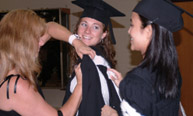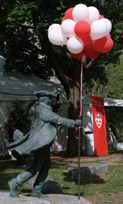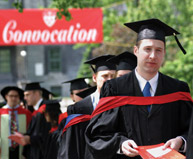Newsbites (Page 5)

Convocation Al Fresco
It's been over three decades since a McGill convocation has been held outdoors, but this spring the graduation ceremony moved out of the athletics centre and back onto lower campus to the delight of many. And to ensure protection from the elements, an enormous tent able to hold about 5,000 people was erected on the field opposite the Redpath Library.

Jack Goldsmith
Eight convocation ceremonies were held under the big top from May 31 to June 4. In addition to these, the Faculty of Music held their convocation in Pollack Hall, while Agricultural and Environmental Sciences at Macdonald Campus - who have regularly held their convocations outdoors - also took the precaution of erecting a tent this year, and naturally, got perfect weather.

Jack Goldsmith
The McGill Alumni Association pitched a tent of their own just opposite the main one, co-hosting receptions for graduating students with the various faculties, and Alumni Services Manager Leisha Lecouvie estimates that 5,000 people visited them over the course of the week. New graduates were welcomed into the Alumni Association and given a live demonstration of the recently launched online web community, AlumniLife. Signing up for the service gave them the chance to win an iPod digital music player.

Owen Egan
"The Alumni tent added to a wonderful spirit on campus," said Lecouvie, "and students and families pouring out of the convocation tent were able to continue to celebrate on campus - even when it rained."
McGill Registrar Sylvia Franke, who assisted Chancellor Dick Pound, BCom'62, BCL'67, in handing out degrees and awards at each ceremony, said that "holding convocation here was wonderful, and a tremendous way to remind everyone on campus who may not normally notice the graduation ceremonies that this is what McGill is all about."

Owen Egan
Seventeen honorary degrees were awarded to an international crowd of luminaries, including Academy Award-winning filmmaker Denys Arcand, president of the International Council of Médecins sans Frontières James Orbinski, and acclaimed pianist Anton Kuerti, among other distinguished scholars and leaders in their fields.
"This is an incomparable group of individuals," said McGill Principal Heather Munroe-Blum. "They represent the kind of academic diversity and international reach that have always been part of McGill's approach to education and research."
The last time McGill held convocation outdoors on the downtown campus was in 1970. Former Principal F. Cyril James hosted a number of outdoor convocations in the 1950s, and the first outdoor ceremony was held in 1938 with World War II looming in the distance.
Honorary Degree Recipients
Denys Arcand is an acclaimed Quebec film director. In his early career at the National Film Board, he made a series of compelling documentaries that examined social and political aspects of Quebec society. His latest film, Les invasions barbares, won an Academy Award for best foreign film this year.
Francesco Bellini played an essential role in the development of 3TC, the first anti-HIV compound, as chief executive officer of BioChem Pharma, and has been unwavering in his support of hospitals, universities and community-based organizations, including McGill.
Clark Blaise is a distinguished author of some 20 volumes of fiction and non-fiction, founded the Creative Writing Program at Concordia University and was one of the legendary Montreal Storytellers.
André Chagnon is an entrepreneur and philanthropist who built one of the most successful multimedia enterprises in North America and Britain. After selling Groupe Vidéotron in 2000, he established the Lucie and André Chagnon Foundation, the largest charitable foundation in Canada, and has made the long-term goal of the foundation preventing poverty and illness in Canada.
Judah Folkman is a surgeon and medical researcher who developed the first atrio-ventricular implantable pacemaker and initiated the field of controlled release technology. His discoveries in angiogenesis opened a field of investigation now pursued worldwide.
Robert Giroux is a public servant and former president and chief executive officer of the Association of Universities and Colleges of Canada. Under his leadership, federal recognition and support of universities and their research has advanced immensely.
Eddie Goldenberg, BA'67, MA'71, BCL'74, is a lawyer, political attaché and one of the authors of the Canadian Charter of Rights and Freedoms. He is the former senior policy advisor and chief of staff to Prime Minister Jean Chrétien.
Father Emmett Johns is the founder of Le Bon Dieu dans la rue, a non-profit organization that assists runaways and homeless youth in Montreal. Father Johns has built Le Bon Dieu dans la rue from a service offering food and compassion for homeless youths to an organization that includes a 20-bed shelter, a day centre, a clinic and a school that offers courses given by experienced remedial educators.
Anton Kuerti is an acclaimed pianist and is one of today's most recorded classical artists, having put on disc all the Beethoven concertos and sonatas, as well as the Schubert sonatas, the Brahms concertos and works by many other composers.
Syukuro Manabe is a climate researcher whose work has played a very important role in our understanding of the global climate and its changes due to the greenhouse effect. His studies have helped to confirm that human activities have indeed had a significant impact on the global climate.
Mortimer Mishkin, MA'49, PhD'51, is one of the world's most distinguished behavioural neuroscientists, whose research on the perception of visual stimuli has led to some of the most fundamental ideas in cognitive neuroscience.
André Morel is a law professor at the Université de Montréal and is one of a handful of scholars rightly associated with the coming of age of Quebec legal education over the last generation. His work in legal history and in civil liberties is recognized as groundbreaking.
Dr. James J. Orbinski is one of the founders of Médecins sans Frontières. In 1998, he was selected as the first non-European president of the MSF International Council and accepted the Nobel Peace Prize on behalf of the organization in 1999.
Mary Robinson is a political leader and human rights advocate who has served as United Nations high commissioner for human rights and as president of Ireland. Her new project, the Ethical Globalization Initiative, is dedicated to bringing the standards of human rights into the globalization process.
Seymour Schulich, BSc'61, MBA'65, is a Montreal-born businessman and entrepreneur who headed Newmont Mining Corporation, one of the world's largest gold mining companies. He is also a generous philanthropist and McGill's Schulich Library of Science and Engineering bears his name in appreciation, as does York University's Schulich School of Business.
Michael D. Sopko, BEng'60, MSc'61, PhD'64, is past Chairman and CEO of the International Nickel Company. As chair of the Advisory Committee to the Department of Mining, Metals and Materials Engineering during the '80s, he helped it double its faculty complement and become the top department of its kind in Canada. He has been instrumental in establishing academic chairs at McGill and other universities.
Irma Thesleff is a molecular biologist at the University of Helsinki in Finland and is a world authority on the development of teeth, the craniofacial bones and other structures. Her research includes the study of cleft lip and palate, as well as how teeth develop from stem cells.


